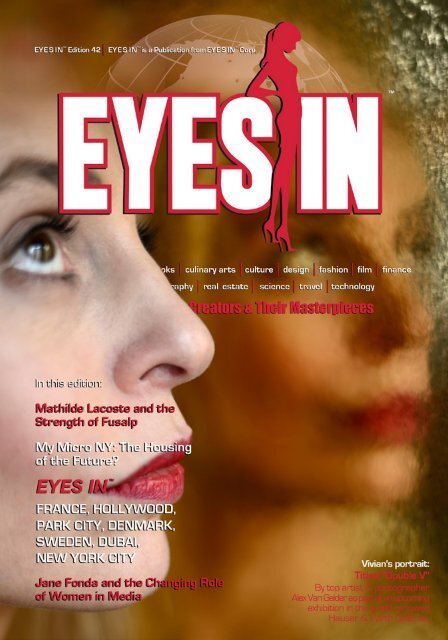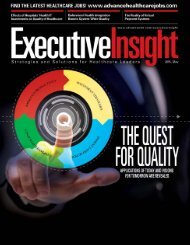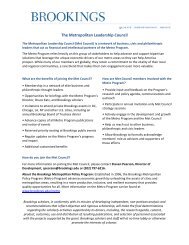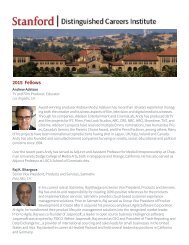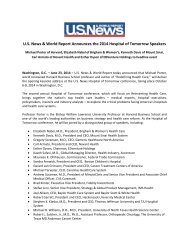Richard Kimball of HEXL Interviewed by Vivian Van Dijk of EyesIn.com.pdf
In this edition @EYESINMagazine shares insightful interviews, images and inspiration from the world’s innovative creators. HEXL CEO Richard A. Kimball, Jr shares his thoughts on health and technology. #RichardAKimballjr
In this edition @EYESINMagazine shares insightful interviews, images and inspiration from the world’s innovative creators. HEXL CEO Richard A. Kimball, Jr shares his thoughts on health and technology. #RichardAKimballjr
- No tags were found...
You also want an ePaper? Increase the reach of your titles
YUMPU automatically turns print PDFs into web optimized ePapers that Google loves.
Dear Reader<br />
This edition’s cover was shot <strong>by</strong> my dear friend, the amazing artist Alex <strong>Van</strong><br />
Gelder. Alex <strong>Van</strong> Gelder is the perfect example <strong>of</strong> an innovative artist who is not<br />
afraid to experiment with new boundaries, seek out-<strong>of</strong>-the-ordinary solutions for<br />
aesthetics, beauty and a deeper meaning <strong>of</strong> artwork within the canvas, blurring<br />
the lines between art and photography. Not only is he an amazing artist, he<br />
also is an incredible person with an open view to life, a humorous approach to<br />
all the things that matter, and one who takes every opportunity to enjoy life and<br />
discover more <strong>of</strong> it.<br />
Being chosen as one <strong>of</strong> his muses (along with his fiancée and another French<br />
lady) for his new art exhibition he is preparing for the Hauser & Wirth Gallery is<br />
a big honor. Happily, my work requires me to be in Paris <strong>of</strong>ten and allowed me to<br />
work on his exhibition during our photo sessions.<br />
It is always great fun because Alex and I never stop talking. There is so much<br />
to talk about if you look at society through the eyes <strong>of</strong> Alex’s mind. We move<br />
mountains with the amount <strong>of</strong> work we produce. This shows me the good side <strong>of</strong><br />
life and work. If you love your work, you do not have that feeling you are working—<br />
which is exactly the case with Alex and me. That is what we have in <strong>com</strong>mon, a<br />
passion for our work and a passion for life. The funny thing is that our work is not<br />
that different if you look at its principles. Alex, as an artist, and I, as an Editor-in-<br />
Chief, both like to <strong>com</strong>municate the innovative, best, and most beautiful side <strong>of</strong><br />
society through art, stories or perspectives.<br />
Alex said something intriguing to me while I was rushing around during Paris<br />
Fashion Week. He said,<br />
“<strong>Vivian</strong>, we need to discover time.”<br />
This is so true and so beautifully phrased.<br />
How can we discover more <strong>of</strong> time?<br />
Alex and I both embrace what is precious. If you do that, you want to discover more<br />
time, but it is also one <strong>of</strong> the most difficult things, as there is so much that is precious<br />
around us... It is the “yin & yang <strong>of</strong> discovery” that will make us seek eternal life.<br />
The fact that Alex was beside the famous French-American artist Louise<br />
Bourgeois during her final years shows a lot. He was one <strong>of</strong> her best friends,<br />
and he was appointed as her photographer and the artist to document her life.<br />
She was a woman seeking eternal life. She lived to be 98 years old, yet, each day,<br />
until her last breath, she worked as if there were no tomorrow, a brilliant creator<br />
focused on her artwork and sculptures.<br />
We do not need to know how long we have to live, if we live like there is no<br />
tomorrow. We would be so much more grateful, work even harder, and<br />
encounter all the moments <strong>of</strong> life with a smile and positive energy. And most<br />
importantly we will all find out that:<br />
“Time is relative, more than precious, and we might discover time itself.”<br />
Enjoy reading, best wishes,<br />
EYES IN Magazine Team<br />
General Contact: Countess <strong>Vivian</strong> <strong>Van</strong> <strong>Dijk</strong>,<br />
Author, Editor-in-Chief & Art Director<br />
vivian_van_dijk@eyesin.<strong>com</strong><br />
press@eyesin.<strong>com</strong><br />
Count Prince Jarl Alexandre Alé de<br />
Basseville - President International<br />
Business Affairs<br />
Neal Henry - Magazine Designer<br />
Francesca Sells - Editor<br />
Darcy Staley - Editor<br />
<strong>Vivian</strong> <strong>Van</strong> <strong>Dijk</strong><br />
Vice-President EYES IN Media Group<br />
Editor-in-Chief EYES IN Magazine and www.eyesin.<strong>com</strong>
Contents<br />
Mathilde Lacoste and the<br />
Strength <strong>of</strong> Fusalp......................................................4<br />
Jane Fonda and the Changing Role<br />
<strong>of</strong> Women in Media..................................................12<br />
My Micro NY: The Housing <strong>of</strong> the Future?....24<br />
Sheikh Mohammed Bin Rashid<br />
Al Maktoum Spearheading Dubai’s<br />
Museum <strong>of</strong> the Future............................................31<br />
<strong>Richard</strong> A. <strong>Kimball</strong>, Jr., on <strong>HEXL</strong>: A Paradigm<br />
Shift for American Healthcare............................37<br />
David Kennedy’s Eat Your Greens: The Surprising<br />
Power <strong>of</strong> Homegrown Leaf Crops...............................49<br />
Technology, Familiarity and the Power<br />
<strong>of</strong> Design: Mathias Bengtsson.............................65<br />
Copyright © 2010 - 2015 EYES IN Corp. & <strong>Vivian</strong> <strong>Van</strong> <strong>Dijk</strong><br />
All rights reserved. No part <strong>of</strong> this magazine may be reproduced or transmitted in any form or <strong>by</strong> any means,<br />
electronical or mechanical, including photocopying, recording, or <strong>by</strong> any information storage or retrieval system,<br />
without permission in writing from the publisher.<br />
Visit us at www.eyesin.<strong>com</strong>.<br />
EYES IN Magazine is a publication from EYES IN Corp. & <strong>Vivian</strong> <strong>Van</strong> <strong>Dijk</strong>.
NEW YORK HEALTH<br />
<br />
EDITION 42<br />
<strong>Richard</strong> A. <strong>Kimball</strong>, Jr., on <strong>HEXL</strong>: A Paradigm<br />
Shift for American Healthcare
NEW YORK HEALTH<br />
<br />
“I think that while there is much talk about information technology and data,<br />
there is much less understanding <strong>of</strong> the <strong>com</strong>plexity <strong>of</strong> the healthcare industry.<br />
I think it needs a major influx <strong>of</strong> this talent, those smart creatives who can<br />
help the healthcare industry. I think there is a powerful symbiosis that can<br />
occur as we put healthcare people together with Silicon Valley folks, and that<br />
intersection will prove to be important.”<br />
Like never before, healthcare in America is<br />
a hot-button item, further dividing political<br />
spheres and polarizing the sick from the<br />
healthy, rich from the poor. With Americans<br />
living longer, new—increasingly costly—<br />
medicines and surgical options, a burgeoning<br />
population, and the increasing demographic<br />
<strong>of</strong> seniors, the nation is on a collision course<br />
if something doesn’t change soon. Whether<br />
a proponent <strong>of</strong> the Affordable Care Act<br />
or opposed to the fundamental ideas <strong>of</strong> a<br />
nationalized healthcare system, no one can<br />
argue with the math.<br />
And that math shows a grim picture.<br />
According to the World Health Organization’s<br />
2014 reports, healthcare spending will rise<br />
to be one-fifth <strong>of</strong> the nation’s economy in less<br />
than 10 years. And while the United States<br />
does lead the world in medical innovations,<br />
it is a poor user and manager <strong>of</strong> its own<br />
discoveries. According to 2014 reports, the<br />
United States ranks behind most countries<br />
on many measures <strong>of</strong> health out<strong>com</strong>es,<br />
quality, and efficiency. We have the highest<br />
healthcare costs with the poorest out<strong>com</strong>e.<br />
Here is where a new player enters the<br />
healthcare scene: Telehealth. Thanks to the<br />
rise <strong>of</strong> mobile devices and applications and<br />
our vastly interconnected world, telehealth<br />
could be the part <strong>of</strong> the solution because <strong>of</strong><br />
the way that it connects the patient with a<br />
medical pr<strong>of</strong>essional without having to go to<br />
the doctor’s <strong>of</strong>fice or the emergency room,<br />
and both parties benefit from avoiding those<br />
associated costs.
NEW YORK HEALTH<br />
<br />
“We spend a ton <strong>of</strong> money for lousy out<strong>com</strong>es because our system is<br />
incentivized to get paid for more visits and more procedures, a fee-for-service<br />
environment. Truth is, doctors don’t get paid if they make people healthy. There<br />
is no <strong>com</strong>pensation program for that, to keep people healthy.”<br />
Telehealth is simply accessing medical<br />
advice and knowledge via mobile or wireless<br />
device, and it could prove to be a real game<br />
changer. According to a 2013 report from<br />
the Healthcare Performance Management<br />
Institute, “70 percent <strong>of</strong> physician visits<br />
and 40 percent <strong>of</strong> hospital ER visits can be<br />
handled <strong>by</strong> a phone call.” The impact that<br />
could have on healthcare costs is enormous.<br />
Telehealth creates a solution for the patient,<br />
first and foremost. But there still lies an<br />
inherent problem in the healthcare industry<br />
from the medical pr<strong>of</strong>essional’s side. Simply<br />
put, if there are fewer patients, there are<br />
fewer medical procedures, and that means<br />
lower pay for doctors and healthcare<br />
personnel. The American healthcare system<br />
is incentivized to treat keep treating patients<br />
if doctors want to make money. Getting<br />
people healthy and out <strong>of</strong> the hospital for<br />
good is not high on the list <strong>of</strong> ways to make<br />
money as a doctor. Sick patients and medical<br />
procedures are the <strong>com</strong>modities.<br />
“The era <strong>of</strong> preventive medicine and home<br />
healthcare monitoring is on the rise. The full<br />
integration <strong>of</strong> telemedicine in our healthcare<br />
delivery system is not far <strong>of</strong>f as developments<br />
in technology continue along with the<br />
improvements in reimbursement,” said<br />
<strong>Richard</strong> A. <strong>Kimball</strong>, Jr., the CEO <strong>of</strong> the new<br />
technology start-up, <strong>HEXL</strong>.<br />
The former investment banker turned<br />
entrepreneur started <strong>HEXL</strong> as his way <strong>of</strong><br />
facilitating that much-needed paradigm<br />
shift that could possibly save the American<br />
economic- and healthcare future.
NEW YORK HEALTH<br />
<br />
“I think that my higher social purpose came from my mother. Also, I<br />
watched my ex-father-in-law, who was successful in government and<br />
business and gave back to serve the country. I feel like this is my time<br />
to do good and help improve society.”
NEW YORK HEALTH<br />
<br />
<strong>HEXL</strong> brings a positive change <strong>by</strong> creating<br />
“population health programs focused on<br />
keeping the chronically ill stable, at home,<br />
and out <strong>of</strong> the hospital. Furthermore,<br />
<strong>HEXL</strong> focuses on and designs beneficial<br />
programs for telehealth, virtual health, home<br />
healthcare, preventative care, and chronic<br />
disease management. <strong>HEXL</strong> technology<br />
improves patient out<strong>com</strong>es and delivers<br />
various benefits, most notably, lower costs<br />
to consumers,” <strong>Kimball</strong> added.<br />
<strong>HEXL</strong> tackles the healthcare problem from<br />
the inside out, setting up a new incentive<br />
program for doctors, hospitals and<br />
insurers, one that makes the ultimate—<br />
and monetarily awarded—goal a healthy<br />
patient who stays out <strong>of</strong> the hospital, rather<br />
than the one dependent upon medical<br />
procedures and medicine.<br />
It’s a big role to tackle, but <strong>Kimball</strong> is intent<br />
on achieving it. After a wildly successful<br />
career in the financial industry for nearly<br />
three decades, he has taken on this new<br />
career with great insight, vigor and purpose<br />
to make his positive mark on the world.<br />
<strong>HEXL</strong> is his way <strong>of</strong> giving back and bettering<br />
society—a pretty great place to start since it<br />
features caring for the sick and needy. But<br />
it’s still an uphill climb, one that will require<br />
the backing <strong>of</strong> technology and government<br />
to realize.
NEW YORK HEALTH<br />
<br />
“We spend twice as much as other developing countries per capita<br />
on healthcare, yet we rank last in positive healthcare out<strong>com</strong>es.”<br />
“The key lies in promoting spending on<br />
information technology infrastructure<br />
among healthcare institutions, especially<br />
with support from the government and the<br />
private sector. This includes the setup <strong>of</strong> a<br />
dedicated high-speed network, as well as the<br />
procurement <strong>of</strong> remote diagnostic testing<br />
facilities, wireless applications, and the<br />
corresponding gadgets. The possibilities for<br />
a more effective healthcare system are truly<br />
endless. And through telehealth, we see how<br />
technology ac<strong>com</strong>plishes what it should first<br />
and foremost: help improve the quality <strong>of</strong><br />
life,” said <strong>Kimball</strong>.<br />
To learn more about <strong>HEXL</strong> and <strong>Richard</strong> A.<br />
<strong>Kimball</strong>, Jr., please visit the Website<br />
www.richardakimballjr.<strong>com</strong>.
NEW YORK HEALTH<br />
<br />
A Conversation With<br />
Entrepreneur and Founder <strong>of</strong><br />
<strong>HEXL</strong>: <strong>Richard</strong> A. <strong>Kimball</strong>, Jr.<br />
As a child, did you know what you wanted<br />
to be<strong>com</strong>e?<br />
I did for my first career, but now I’m on my<br />
second. My first career I was an investment<br />
banker for 26 years and I wanted to do that<br />
when I was a child. I followed my dream and<br />
achieved that, and then retired.<br />
In which town did you grow up?<br />
I grew up in the Northeast. I was born<br />
outside <strong>of</strong> Boston and lived in Myrtle Head,<br />
Massachusetts. I went to boarding school in<br />
Andover and then went to Yale University. I<br />
worked most <strong>of</strong> my career as an investment<br />
banker in New York, but also Tokyo, Hong<br />
Kong, London, Paris and Geneva.<br />
Do you think your background has<br />
influenced your chosen pr<strong>of</strong>ession in the<br />
healthcare industry? If so, what specific<br />
element in your background is most<br />
pervasive in influencing your current<br />
approach in your pr<strong>of</strong>ession?<br />
I really followed my father’s footsteps into<br />
the security’s business. I really wanted to be<br />
connected to my father, and when he would<br />
<strong>com</strong>e home from work I always asked him<br />
about what the stock market did that day,<br />
and learned a lot about the markets from my<br />
dad. My mother is a district county minister.<br />
In midlife, after being a social worker for a<br />
very long time, she found that giving food and<br />
furniture to needy people wasn’t getting them<br />
out <strong>of</strong> their situation. She decided that she<br />
wanted to make a greater impact on the world,<br />
and so she thought that if she could minister<br />
and counsel them that that would be a better<br />
way to help them get their lives on track.<br />
So I think that my higher social purpose<br />
came from my mother. Also, I watched<br />
my ex-father-in-law, who was successful in<br />
government and business and gave back to<br />
serve the country. I feel like this is my time<br />
to do good and help improve society.<br />
Your background is as a financial executive<br />
with investment banking, venture capital and<br />
public policy experience. How did you be<strong>com</strong>e<br />
interested in the healthcare industry?<br />
I felt that I had not made enough <strong>of</strong> an impact<br />
upon the world as an investment banker, and<br />
so I wanted to be an entrepreneur who could<br />
cause a transformation in the United States,<br />
specifically the healthcare industry, which is<br />
so dysfunctional at the moment.<br />
Would you please describe the work<br />
that you do and your interests in the<br />
healthcare industry?<br />
As you probably know, we spend three<br />
trillion dollars a year on healthcare in the<br />
United States. Eighty percent <strong>of</strong> that is<br />
for people with chronic conditions, but we<br />
prescribe a series <strong>of</strong> medication and then<br />
send them home, knowing that there is less<br />
than a 50 percent adherence rate to taking<br />
the medication. They are unlikely to change<br />
their diet and lifestyle. In 5-10 years, those<br />
people will end up back in the hospital with<br />
another serious condition. The system<br />
has let these people down. We knew what<br />
the problem was, knew they couldn’t fix it<br />
themselves, yet we spend 18 percent <strong>of</strong> our<br />
GDP on healthcare and still can’t figure out<br />
how to help these people help themselves.<br />
Most <strong>of</strong> the estimates suggest that we are<br />
over-utilizing and wasting over one trillion<br />
dollars a year out <strong>of</strong> the three trillion spent<br />
on healthcare. There are great debates<br />
in Washington over how to save just one<br />
trillion over 10 years, when this is a problem<br />
accumulating 10 trillion over 10 years.
NEW YORK HEALTH<br />
<br />
With demographics and the aging population,<br />
mathematically we are going to end up with<br />
a larger share <strong>of</strong> the resources going to pay<br />
for healthcare, and bad healthcare at that,<br />
if we don’t change something. We spend<br />
twice as much as other developing countries<br />
per capita on healthcare, yet we rank last in<br />
positive healthcare out<strong>com</strong>es. We spend a<br />
ton <strong>of</strong> money for lousy out<strong>com</strong>es because<br />
our system is incentivized to get paid for<br />
more visits and more procedures, a fee-forservice<br />
environment. Truth is, doctors don’t<br />
get paid if they make people healthy. There is<br />
no <strong>com</strong>pensation program for that—keeping<br />
people healthy.<br />
Would you share with us about your<br />
healthcare technology startup <strong>HEXL</strong>.<strong>com</strong>?<br />
We do two main things at <strong>HEXL</strong>. First, we<br />
change the reimbursement paradigm. We<br />
enter into contracts to take calculated risks<br />
on populations <strong>of</strong> people. So for a senior,<br />
the government will pay through Medicare<br />
approximately $12,000/year per senior.<br />
At the moment that is being paid out <strong>by</strong> a<br />
steeper service environment, but there is a<br />
group <strong>of</strong> 13 million members in Medicare<br />
Advantage that is administered <strong>by</strong> private<br />
insurers who already take the calculated<br />
risks on that population, just as I suggest.<br />
The problem is, those are insurance<br />
<strong>com</strong>panies, not doctors or hospitals, and all<br />
the marketing and claims processing behind<br />
it all is designed for the insurance business,<br />
not healthcare. [Insurers] don’t know how<br />
to give care differently; that’s the job <strong>of</strong> the<br />
doctors and hospital pr<strong>of</strong>essionals.<br />
What we are able to do as the agents <strong>of</strong><br />
the doctors is that we can re-contract with<br />
those payers on those Medicare lives, and<br />
now we own the risk and therefore are<br />
incentivized to put together a chronic care<br />
management program to keep people with<br />
chronic conditions stable, at home, and out<br />
<strong>of</strong> the hospital.
NEW YORK HEALTH<br />
<br />
So the first innovation is changing that<br />
paradigm and creating that incentive to keep<br />
people healthy, and the second is putting<br />
into place the care coordination capability<br />
to manage those people who do need the<br />
services and to manage those diseases.<br />
You speak <strong>of</strong> “telehealth” and it being<br />
the new face <strong>of</strong> “affordable healthcare.”<br />
Would you elaborate upon that and tell us<br />
how you see healthcare transforming as<br />
technology expands?<br />
Yes. For example, if you take 10,000<br />
seniors, you get all the wellness and health<br />
information on them that you can, all which<br />
help inform you on who are the 2,000 who<br />
will generate most <strong>of</strong> the cost. From there<br />
you can predict who are the active users<br />
<strong>of</strong> the expensive services and put in place<br />
programs to help those people manage<br />
their diseases to stay stable. In nations<br />
with nationalized healthcare, the country<br />
itself is managing that risk, so the country<br />
is incentivized through the national health<br />
system to improve out<strong>com</strong>es and lower<br />
cost. The challenge everywhere is that there<br />
is a <strong>com</strong>petition for these budgets without<br />
enough money, creating a sort <strong>of</strong> healthcare<br />
“rationing” going on.<br />
How can people learn more about <strong>HEXL</strong>?<br />
Generally, we are going to insurance<br />
<strong>com</strong>panies and physician groups, where<br />
we then facilitate helping them learn how to<br />
take these risks and take care <strong>of</strong> patients<br />
better. We will be the infrastructure that<br />
enables those capabilities, the technology and<br />
services. We are creating a holistic capability<br />
that attaches to each patient, understanding<br />
their specifics and serves to them what they<br />
need to manage their health. And because<br />
the pr<strong>of</strong>essionals are being paid to keep<br />
people healthy, it’s transformative.
NEW YORK HEALTH<br />
<br />
What do you see as the negative and the<br />
positive aspects <strong>of</strong> this new trend toward<br />
telehealth?<br />
We believe we can bring costs down to 20 or<br />
30 percent and improve the out<strong>com</strong>es. This<br />
is significant. It can fundamentally change<br />
how we care for people in this country.<br />
What is the most fun part <strong>of</strong> your job?<br />
Working with leaders <strong>of</strong> various <strong>com</strong>panies<br />
and helping them understand what the<br />
future looks like, and working with them<br />
to create new models for the future. It’s<br />
powerful to have these conversations with<br />
people, and watch the light <strong>com</strong>e on and<br />
have them want to help see this grow.<br />
People are frustrated enough to want<br />
change, and we have the technology to<br />
change it and build a new program for<br />
the future. I find that very exciting, and it’s<br />
an important and pr<strong>of</strong>ound time in the<br />
healthcare industry.<br />
In which way do you think a pr<strong>of</strong>ession<br />
in finance/business and healthcare are<br />
different and/or similar?<br />
I think that finance and business, generally,<br />
are more analytical, left-brain types <strong>of</strong><br />
activity. Healthcare has been an industry<br />
that requires the interpersonal, to create<br />
the appropriate solution for each individual,<br />
and I think that the reality is that the two<br />
need to be integrated, the analytical with the<br />
creative. I do not think that has happened<br />
very well or been pursued to its greatest<br />
potential. It’s a weird industry where supply<br />
drives demand. Where there are more<br />
hospitals and hospital beds, there are more<br />
services being performed.<br />
Do you aspire to collaborate in your<br />
pr<strong>of</strong>ession with a creator from another<br />
innovative discipline? Or do you have a<br />
favorite <strong>com</strong>pany with whom you would<br />
like to work?<br />
I think that while there is much talk about<br />
information technology and data, there is<br />
much less understanding <strong>of</strong> the <strong>com</strong>plexity<br />
<strong>of</strong> the healthcare industry. I think it needs<br />
a major influx <strong>of</strong> this talent, those smart<br />
creatives who can help the healthcare<br />
industry. I think there is a powerful symbiosis<br />
that can occur as we put healthcare people<br />
together with Silicon Valley folks, and that<br />
intersection will prove to be important.<br />
Do you follow any philosophical or<br />
psychological approach in your pr<strong>of</strong>ession<br />
and/or daily life?<br />
When I was 19 I became interested in<br />
Buddhism and lived in Asia for many years.<br />
There I learned how people and business<br />
leaders integrated Buddhism into their<br />
daily lives and careers. There were a<br />
billion businessman, but they lived with a<br />
quiet, confident, serene way about them.<br />
Working on Wall Street for 26 years, I<br />
was able to <strong>com</strong>e into all that with the<br />
same roundedness and peace, despite the<br />
environment. I think I showed the people I<br />
worked with a more gentle and respectful<br />
way <strong>of</strong> working than what most people in<br />
the industry lean toward. Some joked that I<br />
was the “Buddha Banker,” joking that I was<br />
always Zen, moving to the beat <strong>of</strong> a different<br />
drum. I was different in my sensibility, less<br />
confrontational and conflicting than most in<br />
the business are. I do meditate regularly, with<br />
my shrines in my homes, and do meditation<br />
retreats with my meditation teachers.
NEW YORK HEALTH<br />
<br />
What is your favorite hotel?<br />
Yes. I love all the Aman hotels, particularly<br />
the Amandari in Bali. The Aman resorts have<br />
done a wonderful job <strong>of</strong> understanding the<br />
local architecture and culture, and building<br />
their hotels to match and celebrate their<br />
local environments.<br />
What would be your ideal home?<br />
I want my homes to be serene. I have<br />
Buddhas, greenery and gold around, along<br />
with fresh flowers. Beautiful, uncluttered,<br />
elegant spaces are my style.<br />
Do you have any dreams for the future,<br />
personally or pr<strong>of</strong>essionally?<br />
I think it is important to stay in the present.<br />
Not live in the future, but still have dreams.<br />
I have a dream <strong>of</strong> making a great impact<br />
on our society in healthcare. I think I’m onto<br />
something important and I’m excited to see<br />
what <strong>com</strong>es. I hope I leave a serene and<br />
gentle impression on the world. That’s my<br />
hope and objective.


